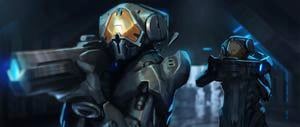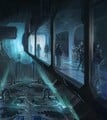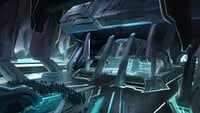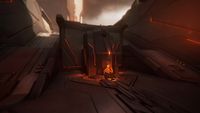Warrior-Servant: Difference between revisions
From Halopedia, the Halo wiki
Guardian117 (talk | contribs) No edit summary |
Sith Venator (talk | contribs) |
||
| (16 intermediate revisions by 9 users not shown) | |||
| Line 1: | Line 1: | ||
{{ | {{Status|Canon}} | ||
{{Center|''This article is about the Forerunner rate. For other uses, see [[Warrior]]''.}} | {{Center|''This article is about the Forerunner rate. For other uses, see [[Warrior]]''.}} | ||
{{Affiliation infobox | {{Affiliation infobox | ||
|name=Warrior-Servants | |name=Warrior-Servants | ||
|image=[[File:Warrior- | |image=[[File:H4 - Warrior-Servants 2.jpg|300px]] | ||
|type=[[Rate|Caste]] / military organization | |type=[[Rate|Caste]] / military organization | ||
|founder= | |founder= | ||
| Line 12: | Line 12: | ||
|legislative=Defense of the ecumene | |legislative=Defense of the ecumene | ||
|legislative-title=Role | |legislative-title=Role | ||
|judicial=Trillions of Warriors | |judicial=Trillions of Warriors{{Ref/Reuse|unc}} | ||
|judicial-title=Size | |judicial-title=Size | ||
|branch=[[Promethean]]s | |branch=[[Promethean]]s | ||
| Line 34: | Line 34: | ||
}} | }} | ||
'''Warrior-Servants''' or '''Warriors''' were the [[rate]] traditionally tasked with defense and warfare in the [[Forerunner]] [[ecumene]]. | '''Warrior-Servants''' or '''Warriors''' were the [[rate]] traditionally tasked with defense and warfare in the [[Forerunner]] [[ecumene]].{{Ref/Site|Id=CryptumGlossary|URL=http://halo.xbox.com/en-us/intel/related/text/cryptum-glossary/62e29c59-a3f9-4b63-af76-def71fda5459|Site=Halo Waypoint|Page=Cryptum Glossary|D=14|M=03|Y=2014|LocalArchive=Halo: Cryptum/Glossary}} In formal proceedings, the rate was also referred to as the '''Warrior-Servant Corps'''.<ref>'''Halo: Cryptum''', ''page 296''</ref> They stood second-lowest in the hierarchy of rates during the last millennia of Forerunner rule. The highest and most respected class of Warrior-Servants were known as the [[Promethean]]s. The rank of [[protector of the ecumene]] — commander of the Forerunner military — was historically held by a high-ranked Warrior-Servant, the most well-known being the [[Ur-Didact]] and his successor, the [[IsoDidact]].<ref>'''Halo: Cryptum''', ''page 233''</ref> | ||
==Overview== | ==Overview== | ||
While the Forerunners preferred to see themselves as peaceful by nature, Warrior-Servants were ruthless in executing warfare against enemies of the ecumene, as they believed that defying the Forerunners was to show contempt toward the [[Mantle]] itself.<ref>'''Halo: Cryptum''', ''page 50''</ref> Although their services were vital in maintaining galactic harmony, most Forerunners viewed their purpose and practices as contradictory to the principles of the Mantle. As | While the Forerunners preferred to see themselves as peaceful by nature, Warrior-Servants were ruthless in executing warfare against enemies of the ecumene, as they believed that defying the Forerunners was to show contempt toward the [[Mantle]] itself.<ref>'''Halo: Cryptum''', ''page 50''</ref> Although their services were vital in maintaining galactic harmony, most Forerunners viewed their purpose and practices as contradictory to the principles of the Mantle. As a result, other rates looked down on the Warrior-Servants, who tended to keep to themselves. <ref name="c107">'''Halo: Cryptum''', ''page 107''</ref> | ||
In battle, Warrior-Servants wore varying types of fighting suits - [[combat skin]]s - the [[war sphinx]] being an example of a medium-sized suit.<ref>'''Halo: Cryptum''', ''page 43''</ref> Warrior | In battle, Warrior-Servants wore varying types of fighting suits - [[combat skin]]s - the [[war sphinx]] being an example of a medium-sized suit.<ref>'''Halo: Cryptum''', ''page 43''</ref> Warrior armour was designed to optimise itself to counter enemy weaponry; this ability was capable of making their armour virtually invulnerable to repeated discharges from Forerunner infantry weapons.<ref>'''[[Halo: Escalation]]''', ''[[Halo: Escalation Issue 10|Issue 10]]''</ref> The Warrior-Servants operated the Forerunners' most prominent [[Forerunner fleet|battle fleets]], comprising warships such as [[Fortress-class vessel]]s, [[Forerunner dreadnought|dreadnoughts]], [[planet-breaker]]s, and [[Forerunner picket cruiser|picket cruisers]]. Warriors employed extensive drone support in the form of dedicated [[monitor]]s and [[sentinel]]s,<ref>'''Halo: Silentium''', ''page 214''</ref> in addition to the [[ancilla]]s of their battle armor and ships.<ref>'''Halo: Cryptum''', ''page 139''</ref> In fleet engagements, individual Warriors could be assigned control of over a million automated [[weapon-ship]]s.<ref>'''Halo: Cryptum''', ''page 174''</ref> Warrior forces were organized into large-scale [[legion]]s which possessed a number of subordinate attack squadrons.<ref>'''Halo: Silentium''', ''pages 104-105''</ref> | ||
As with the other rates, Warrior-Servant [[form]]s were shaped based on qualities deemed most useful in their role; to best suit fighting and warfare, Warriors were more powerfully built and more robust than the other rates.<ref>'''Halo: Cryptum''', ''page 279''</ref> While it was rarely necessary to engage in close-quarters combat in actual warfare, Warriors still possessed remarkable physical strength.<ref>'''Halo: Silentium''', ''page 86''</ref> The augmented mental capacity of Warrior commanders allowed them to perceive reality in many separate reference | As with the other rates, Warrior-Servant [[form]]s were shaped based on qualities deemed most useful in their role; to best suit fighting and warfare, Warriors were more powerfully built and more robust than the other rates.<ref>'''Halo: Cryptum''', ''page 279''</ref> While it was rarely necessary to engage in close-quarters combat in actual warfare, Warriors still possessed remarkable physical strength.<ref>'''Halo: Silentium''', ''page 86''</ref> The augmented mental capacity of Warrior commanders allowed them to perceive reality in many separate reference frames with alternating flows of time while sharing sensory input with their compatriots.<ref>'''Halo: Cryptum''', ''pages 162, 316''</ref> | ||
In the event of death, Warrior fighting suits were programmed to retain their wearer's last personality impressions for future study.<ref>'''Halo: Cryptum''', ''page 137''</ref> It was also a common policy among Warriors to [[Mind transfer|extract]] the memory impressions of their vanquished foes before executing them.<ref>'''Halo: Cryptum''', ''page 188''</ref> However, in the case of opponents they deemed worthy, it was considered more honorable to execute them outright.<ref>'''Halo: Primordium''', ''page 235''</ref> | In the event of death, Warrior fighting suits were programmed to retain their wearer's last personality impressions for future study.<ref>'''Halo: Cryptum''', ''page 137''</ref> It was also a common policy among Warriors to [[Mind transfer|extract]] the memory impressions of their vanquished foes before executing them.<ref>'''Halo: Cryptum''', ''page 188''</ref> However, in the case of opponents they deemed worthy, it was considered more honorable to execute them outright.<ref>'''Halo: Primordium''', ''page 235''</ref> | ||
| Line 52: | Line 52: | ||
Even though they eventually ranked second-lowest, the Warrior-Servants, particularly their highest and most respected [[Promethean]] class, still wielded remarkable political power and were in a prestigious social standing, serving in various roles in the [[Ecumene Council]] by the time of the [[human-Forerunner wars]] in [[107,445 BCE]].<ref>'''Halo: Cryptum''', ''page 59''</ref> After the conclusion of the war with humanity, the Prometheans, under the leadership of the [[Ur-Didact|Didact]], were opposed to the [[Builder]]s' plan to construct a new superweapon known as [[Halo Array|Halo]].<ref>'''Halo: Silentium''', ''pages 43-44''</ref> | Even though they eventually ranked second-lowest, the Warrior-Servants, particularly their highest and most respected [[Promethean]] class, still wielded remarkable political power and were in a prestigious social standing, serving in various roles in the [[Ecumene Council]] by the time of the [[human-Forerunner wars]] in [[107,445 BCE]].<ref>'''Halo: Cryptum''', ''page 59''</ref> After the conclusion of the war with humanity, the Prometheans, under the leadership of the [[Ur-Didact|Didact]], were opposed to the [[Builder]]s' plan to construct a new superweapon known as [[Halo Array|Halo]].<ref>'''Halo: Silentium''', ''pages 43-44''</ref> | ||
Though they managed to forestall the construction of the Halos for thousands of years, while preparing a | Though they managed to forestall the construction of the Halos for thousands of years, while preparing a defence of their own known as the [[shield world]]s, the Didact and the Warrior-Servants eventually lost the political war as a result of [[Master Builder]] [[Faber]]'s political maneuvering. When the Builders rose to supreme power within the Council circa [[98,445 BCE]], the Warrior-Servants were diminished as a rate, with their fleets and armies being systematically disbanded over the course of the next millennium as part of the Master Builder's scheme to secure the primacy of the Builder rate.<ref name="c239">'''Halo: Cryptum''', ''page 238-239''</ref> This would leave the ecumene ill-prepared for the [[Forerunner-Flood war|Return of the Flood]]. However, many Warriors chose to move to the Builder rate, becoming part of [[Builder Security]].<ref>'''Halo: Silentium''', ''page 47''</ref> The Didact and the Promethean commanders who had supported him were accorded harsh punishments, often execution, though many were offered the choice of self-imposed exile in "Warrior Keeps" known as [[Cryptum]]s.<ref>'''Halo: Cryptum''', ''page 182''</ref> | ||
Trillions of Warrior-Servants were killed in their ultimately futile efforts to contain the Flood during the three-century-long [[Forerunner-Flood war]].<ref name="unc">[https://www.halowaypoint.com/en-us/ | Trillions of Warrior-Servants were killed in their ultimately futile efforts to contain the Flood during the three-century-long [[Forerunner-Flood war]].<ref name="unc">[https://www.halowaypoint.com/en-us/news/canon-fodder-uncharted-waters '''Halo Waypoint''': ''Canon Fodder - Uncharted Waters'']</ref> In the final years of the conflict, after the Master Builder was stripped of his power due to his crimes, the standing of the Warrior-Servants was elevated once again with the [[IsoDidact]], an imprinted copy of the Didact, being placed in command of Forerunner defense.<ref>'''Halo: Silentium''', ''page 20''</ref> Many former Warriors still remained in Builder Security, but their forces were combined with those of the Warrior-Servants in newly reconstituted forces led by the IsoDidact.<ref>'''Halo: Silentium''', ''page 197''</ref> | ||
==Known Warriors== | ==Known Warriors== | ||
| Line 64: | Line 64: | ||
*The [[Strategos]] | *The [[Strategos]] | ||
*The [[Ur-Didact]] | *The [[Ur-Didact]] | ||
*[[Adequate-Observer]] | |||
*[[Animus-To-Remain]] | |||
*[[Bitterness-of-the-Vanquished]] (later Builder Security) | |||
*[[Capital-Enforcer]] | |||
*[[Dutiful-Marcher]] | |||
*[[Endurance-of-Will]] | *[[Endurance-of-Will]] | ||
*[[Glory of a Far Dawn]] | *[[Glory of a Far Dawn]] | ||
*[[Habit-To-Sever]] | |||
*[[Malice-Begets-Demise]] | |||
*[[Sharp-by-Striking]] (later Builder Security) | *[[Sharp-by-Striking]] (later Builder Security) | ||
*[[Sorrow-for-Lost-Voices]] | *[[Sorrow-for-Lost-Voices]] | ||
*[[Sprightly-Runner]] | *[[Sprightly-Runner]] | ||
==Gallery== | ==Gallery== | ||
<gallery> | <gallery> | ||
File:H4-Terminal-WarriorServants.jpg|Warrior-Servants on Charum Hakkor. | File:H4-Terminal-WarriorServants.jpg|Warrior-Servants on Charum Hakkor. | ||
File:H4-Terminal-WarriorServant.jpg|A Warrior-Servant using an unidentified energy-based weapon. | File:H4-Terminal-WarriorServant.jpg|A Warrior-Servant using an unidentified energy-based weapon. | ||
File:H4 - Warrior-Servants 2.jpg|Warrior-Servants | File:H4 Concept DefeatedAncestors.jpg|Warrior-Servants guarding captured Ancestors on Charum Hakkor. | ||
File:H4 Terminals ForerunnerWarriors Concept.jpg|Concept art of Warrior-Servants and the Didact. | |||
File:H4 Terminals ForerunnerWarriors Concept 2.jpg|Concept art of Warrior-Servants. | |||
File:H4-SO-Cauldron-05.jpg|Warrior-Servant architecture. | File:H4-SO-Cauldron-05.jpg|Warrior-Servant architecture. | ||
File:HM_Warrior-Servant.png|An illustration of a Warrior-Servant in ''[[Halo Mythos: A Guide to the Story of Halo]]''. | |||
</gallery> | </gallery> | ||
| Line 87: | Line 92: | ||
*''[[Halo: Primordium]]'' | *''[[Halo: Primordium]]'' | ||
*''[[Halo 4]]'' | *''[[Halo 4]]'' | ||
**''[[Terminal | **''[[Terminal (Halo 4)|Terminals]]'' | ||
**''[[Spartan Ops]]'' | **''[[Spartan Ops]]'' | ||
*''[[Halo: Silentium]]'' | *''[[Halo: Silentium]]'' | ||
| Line 99: | Line 104: | ||
**''[[Promises to Keep]]'' | **''[[Promises to Keep]]'' | ||
**''[[Defender of the Storm]]'' | **''[[Defender of the Storm]]'' | ||
*''[[Halo: Renegades]]'' {{C|Technology only}} | |||
*''[[Halo: Point of Light]]'' {{C|Technology only}} | |||
*''[[Halo: Epitaph]]'' | |||
==Sources== | ==Sources== | ||
{{ | {{Ref/Sources|2}} | ||
{{Forerunner rates}} | {{Forerunner rates}} | ||
[[Category:Warrior-Servants| ]] | [[Category:Warrior-Servants| ]] | ||
[[Category:Forerunner rates]] | [[Category:Forerunner rates]] | ||
[[Category:Forerunner military units| ]] | [[Category:Forerunner military units| ]] | ||
Latest revision as of 00:19, February 27, 2024
| Warrior-Servants | |
|---|---|

| |
| Rate overview | |
|
Type: |
Caste / military organization |
|
Rate head: |
|
|
Role: |
Defense of the ecumene |
|
Size: |
Trillions of Warriors[1] |
|
Subgroups: |
|
| Societal overview | |
|
Official language(s): |
|
|
Official religion(s): |
|
|
Official script(s): |
|
|
Notable event(s): |
|
|
Tier 1 | |
| Historical overview | |
|
Affiliation: |
|
Warrior-Servants or Warriors were the rate traditionally tasked with defense and warfare in the Forerunner ecumene.[2] In formal proceedings, the rate was also referred to as the Warrior-Servant Corps.[3] They stood second-lowest in the hierarchy of rates during the last millennia of Forerunner rule. The highest and most respected class of Warrior-Servants were known as the Prometheans. The rank of protector of the ecumene — commander of the Forerunner military — was historically held by a high-ranked Warrior-Servant, the most well-known being the Ur-Didact and his successor, the IsoDidact.[4]
Overview[edit]
While the Forerunners preferred to see themselves as peaceful by nature, Warrior-Servants were ruthless in executing warfare against enemies of the ecumene, as they believed that defying the Forerunners was to show contempt toward the Mantle itself.[5] Although their services were vital in maintaining galactic harmony, most Forerunners viewed their purpose and practices as contradictory to the principles of the Mantle. As a result, other rates looked down on the Warrior-Servants, who tended to keep to themselves. [6]
In battle, Warrior-Servants wore varying types of fighting suits - combat skins - the war sphinx being an example of a medium-sized suit.[7] Warrior armour was designed to optimise itself to counter enemy weaponry; this ability was capable of making their armour virtually invulnerable to repeated discharges from Forerunner infantry weapons.[8] The Warrior-Servants operated the Forerunners' most prominent battle fleets, comprising warships such as Fortress-class vessels, dreadnoughts, planet-breakers, and picket cruisers. Warriors employed extensive drone support in the form of dedicated monitors and sentinels,[9] in addition to the ancillas of their battle armor and ships.[10] In fleet engagements, individual Warriors could be assigned control of over a million automated weapon-ships.[11] Warrior forces were organized into large-scale legions which possessed a number of subordinate attack squadrons.[12]
As with the other rates, Warrior-Servant forms were shaped based on qualities deemed most useful in their role; to best suit fighting and warfare, Warriors were more powerfully built and more robust than the other rates.[13] While it was rarely necessary to engage in close-quarters combat in actual warfare, Warriors still possessed remarkable physical strength.[14] The augmented mental capacity of Warrior commanders allowed them to perceive reality in many separate reference frames with alternating flows of time while sharing sensory input with their compatriots.[15]
In the event of death, Warrior fighting suits were programmed to retain their wearer's last personality impressions for future study.[16] It was also a common policy among Warriors to extract the memory impressions of their vanquished foes before executing them.[17] However, in the case of opponents they deemed worthy, it was considered more honorable to execute them outright.[18]
Warrior-Servants had their own system of unique hand signals and gestures. Raising one's hand and giving it a half-turn was the sign for "command received".[19] Marking a Y over one's forehead and the bridge of their nose signified an admission of shame and guilt,[20] while touching the sixth finger of one's left hand conveyed "vengeful sympathy".[21]
History[edit]
Ten million years before the final days of the Forerunner civilization, the Warriors were the highest rate.[22] They were the ones responsible for rebelling against the Precursors and hunting them down to near-extinction.[23] Their status would gradually move lower over several millions of years, in part due to an increase in the political power of their Builder competitors and because the other rates viewed their field of work with distaste. This decrease of status would result in the name of their rate being suffixed with "-Servant", although on some occasions they were still referred to as "Warriors".[24]
Even though they eventually ranked second-lowest, the Warrior-Servants, particularly their highest and most respected Promethean class, still wielded remarkable political power and were in a prestigious social standing, serving in various roles in the Ecumene Council by the time of the human-Forerunner wars in 107,445 BCE.[25] After the conclusion of the war with humanity, the Prometheans, under the leadership of the Didact, were opposed to the Builders' plan to construct a new superweapon known as Halo.[26]
Though they managed to forestall the construction of the Halos for thousands of years, while preparing a defence of their own known as the shield worlds, the Didact and the Warrior-Servants eventually lost the political war as a result of Master Builder Faber's political maneuvering. When the Builders rose to supreme power within the Council circa 98,445 BCE, the Warrior-Servants were diminished as a rate, with their fleets and armies being systematically disbanded over the course of the next millennium as part of the Master Builder's scheme to secure the primacy of the Builder rate.[27] This would leave the ecumene ill-prepared for the Return of the Flood. However, many Warriors chose to move to the Builder rate, becoming part of Builder Security.[28] The Didact and the Promethean commanders who had supported him were accorded harsh punishments, often execution, though many were offered the choice of self-imposed exile in "Warrior Keeps" known as Cryptums.[29]
Trillions of Warrior-Servants were killed in their ultimately futile efforts to contain the Flood during the three-century-long Forerunner-Flood war.[1] In the final years of the conflict, after the Master Builder was stripped of his power due to his crimes, the standing of the Warrior-Servants was elevated once again with the IsoDidact, an imprinted copy of the Didact, being placed in command of Forerunner defense.[30] Many former Warriors still remained in Builder Security, but their forces were combined with those of the Warrior-Servants in newly reconstituted forces led by the IsoDidact.[31]
Known Warriors[edit]
- The Confirmer
- The Examiner (later Builder Security)
- The Falchion
- The Grammarian
- The IsoDidact
- The Strategos
- The Ur-Didact
- Adequate-Observer
- Animus-To-Remain
- Bitterness-of-the-Vanquished (later Builder Security)
- Capital-Enforcer
- Dutiful-Marcher
- Endurance-of-Will
- Glory of a Far Dawn
- Habit-To-Sever
- Malice-Begets-Demise
- Sharp-by-Striking (later Builder Security)
- Sorrow-for-Lost-Voices
- Sprightly-Runner
Gallery[edit]
An illustration of a Warrior-Servant in Halo Mythos: A Guide to the Story of Halo.
List of appearances[edit]
- Halo: Cryptum (First appearance)
- Halo: Primordium
- Halo 4
- Halo: Silentium
- Rebirth
- Halo: Spartan Strike
- Halo 2: Anniversary (Mentioned only)
- Halo: Last Light (Mentioned only)
- Halo 5: Guardians
- Halo Mythos
- Halo: Fractures
- Halo: Renegades (Technology only)
- Halo: Point of Light (Technology only)
- Halo: Epitaph
Sources[edit]
- ^ a b Halo Waypoint: Canon Fodder - Uncharted Waters
- ^ Halo Waypoint, Cryptum Glossary (Retrieved on Mar 14, 2014) [local archive] [external archive]
- ^ Halo: Cryptum, page 296
- ^ Halo: Cryptum, page 233
- ^ Halo: Cryptum, page 50
- ^ Halo: Cryptum, page 107
- ^ Halo: Cryptum, page 43
- ^ Halo: Escalation, Issue 10
- ^ Halo: Silentium, page 214
- ^ Halo: Cryptum, page 139
- ^ Halo: Cryptum, page 174
- ^ Halo: Silentium, pages 104-105
- ^ Halo: Cryptum, page 279
- ^ Halo: Silentium, page 86
- ^ Halo: Cryptum, pages 162, 316
- ^ Halo: Cryptum, page 137
- ^ Halo: Cryptum, page 188
- ^ Halo: Primordium, page 235
- ^ Halo: Silentium, page 24
- ^ Halo: Silentium, page 85
- ^ Halo: Silentium, page 83
- ^ Halo: Silentium, page 14
- ^ Halo: Silentium, page 251
- ^ Halo: Silentium, page 53
- ^ Halo: Cryptum, page 59
- ^ Halo: Silentium, pages 43-44
- ^ Halo: Cryptum, page 238-239
- ^ Halo: Silentium, page 47
- ^ Halo: Cryptum, page 182
- ^ Halo: Silentium, page 20
- ^ Halo: Silentium, page 197
| |||||






